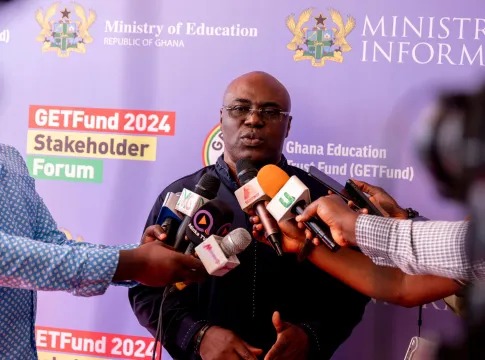
Audio By Carbonatix
In recent years, the Ghana Education Trust Fund (GETFund) has digitised its project management, monitoring and evaluation to enhance efficiency and transparency.
This means personnel from the Fund do not have to physically visit project sites to update themselves on projects as they could monitor the contractors with the help of technology.
These are part of the reforms that have been instituted by GETFund under the leadership of the Administrator, Richard Ampofo Boadu.

GETFund project portfolio
So far, 11,248 projects have been initiated since the inception of GETFund in the year 2000 by Act of Parliament, Act 581.
These include 6,272 projects at the basic education level, 3,863 secondary school improvement projects, 101 E-blocks, nine model schools four TVET centres as well as 999 projects at the tertiary levels.

Addressing a forum in Accra on Tuesday, October 22, 2024, Dr Boadu indicated the reforms will “ensure transparency and effective outcomes.”
Some of the deliverables from reforms he noted, include “streamlining eligibility criteria, digitise application process, emphasis on STEM subjects and increased support for girl-child education this giving extra weighing to female applicants.”

Solving embarrassing problems
According to the GETFund Administrator, the reforms have also "overhauled the bottlenecks that created the embarrassing situation of foreign scholars’ fees and stipends not being paid on time with harrowing consequences among as well as scholarship programme monitoring."
He disclosed: “The Fund’s scholarship reforms have borne fruits concerning foreign scholarships as it moved from awarding 104 at graduate and undergraduate levels in 2017/2018 to 352 in 2019/2020 academic years.

“At the local level award level, the number of awardees at all levels stood at 333 in 2017/2018, jumping to 1,680 in the 2022/2023 academic year and to over 4,200 in the 2022/2023 academic year,” Dr Boadu added.
The core mandate of GETFund is to provide funding to supplement government efforts for the provision of educational infrastructure and facilities within the public sector from the pre-tertiary to the tertiary levels.

Increase in local scholarships
Meanwhile, 5,026 persons have benefited from local scholarships for the 2023/2024 academic year.
It is a sharp rise from the number that was awarded to applicants in the 2019/2020 academic year which stood at 1,680.
The majority of the local scholarships estimated at 74%, go to public universities.
Latest Stories
-
Lekzy DeComic gears up for Easter comedy special ‘A Fool in April’
1 hour -
Iran declares 40 days of national mourning after Ayatollah Ali Khamenei’s death
2 hours -
Family of Maamobi shooting victim makes desperate plea for Presidential intervention
3 hours -
Middle East turmoil threatens to derail Ghana’s single-digit gains
4 hours -
Free-scoring Semenyo takes burden off Haaland
4 hours -
Explainer: Why did the US attack Iran?
5 hours -
Peaky Blinders to The Bride!: 10 of the best films to watch in March
5 hours -
Crude oil price crosses $91 as Strait of Hormuz blockade chokes 22% of global supply
6 hours -
Dr. Hilla Limann Technical University records 17% admission surge; launches region’s first cosmetology laboratory
7 hours -
Over 50 students hospitalised after horror crash ends sports tournament
7 hours -
Accra–Dubai flights cancelled as Middle East tensions deepen
7 hours -
See the areas that will be affected by ECG’s planned maintenance from March 1-5
8 hours -
Kane scores twice as Bayern beat rivals Dortmund
9 hours -
Lamine Yamal hits first hat-trick in Barcelona win
9 hours -
Iran says US and Israel strikes hit school killing 108
9 hours

